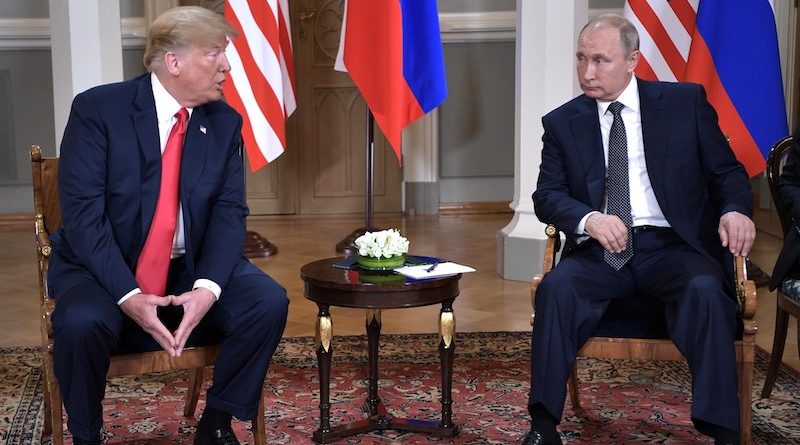Akshobh Giridharadas on U.S.-Russian Relations in the Age of Information Warfare
The United States Presidential elections in 2016 was a watershed moment for several reasons. Apart from the unconventional victory of then businessman Donald Trump, it was an election that had accusations of hacking, the term ‘fake news’ got codified into the everyday lexicon and there was news of Russian involvement, to unprecedented levels, not seen since the Cold War.
In an age of information overload, there are growing pernicious dangers of information warfare. Russia Today (RT) has subtly branded itself as Russia’s premium English language news channel which is also the main outlet to present the western and the rest of the English-speaking world the Russian perspective.
Post-election postmortem showed that RT had helped then candidate Trump as the editor of RT had mentioned Trump a record 27 times in a single video. This video according to experts encapsulates Russian information and warfare.According to some Russia watchers, RT isn’t the single cudgel that the government uses in its information warfare.
The story begins prior to 2016. As many would be wondering, what is Russia’s goal? What is the Kremlin trying to achieve? The emphasis is on Moscow trying to get the ‘West’ on an equal goal. Many who remained flummoxed as to both Trump’s affinity for Russia and the Russian affinity for Trump tend to miss the bigger picture.
It goes back to 2007 where President Vladimir Putin at the Munich Security Conference unleashed a tirade on the ‘Western world order’, and accused the United States of undermining global security. The Russian media dubbed his speech as ‘iconic or prophetic’.Russia has had its own independent foreign policy outlook for years and will not want to lose that independence. Moscow has disagreements with erstwhile Soviet nations, it acts on its own will. Such as the cyber-attacks on Estonia in 2007. This mitigated Estonia’s integration to US-Transatlantic relations. Russian tanks rolled into Georgia as disagreements with the neighbor heightened in 2008. In 2014, Russia and Ukraine disagreed over Crimea and Moscow didn’t think twice about the heavy weight of sanctions against it before deciding to invade Crimea.
Russia has even used the same tactic of fake news in the Netherlands during the 2017 elections. As early as 2016, the Kremlin realized the friction in the Dutch and EU relationship. The belief was that a growing ‘Nexit’ (Dutch exit from the EU) was looming with a growing resentment towards the EU. The Dutch resented Brussels’ interference in their internal affairs. The Kremlin’s henchmen hooked up with far right and far left in Holland to tap into this resentment.
The disaster of Malaysian airlines MH17, which was shot down while overflying Ukraine, was a huge factor in helping Russia weaponize the Dutch hatred for the EU. A ‘Nexit’ would mean a weaker EU and the potential of a possible Russian ally.
RT wants to provide the Americans and the rest of the English-speaking world with an alternative view. Coming back to the U.S elections of 2016, Russia gradually increased its campaign through disinformation. Fake social media accounts Blacktivist – a combination of the words black activists were created to fuel racial tensions in the run up to the elections. Historically, the former Soviet Union had also tapped into the disenchantment of the African American community during the Civil Rights movement of the 60s through more covert means of the KGB.
Social Media has become advertising tools for Russian information warfare and it has turned into a rabbit hole of disinformation. This accentuates a complete lack of trust in the political establishment and the broader society.
Russian flags have been handed out in Conservative Political Action Committee (CPAC) after Trump was elected and since Trump’s inauguration, the CAATSA sanctions have been enforced adding Russia to the list in August 2017.
In February to October of 2018, there have been four set of indictments pertaining to Russian cyberattacks and meddling in elections. One Russia analyst likened social media regulation to the earlier era of the car where there were no windscreens and seatbelts yet. This is to say that the driver needs to drive with caution and regulation right now is a work in progress.What many find genuinely upsetting about the 2016 elections is the intensity of what Russia did and the surreptitious manner in which Russia proceeded.
Similarly, in Ukraine there is significant levels of distrust and people don’t trust the free and fairness of the electoral process. Meanwhile in Russia, Putin has been in power for two decades and shows little sign of letting the scepter go.
This piece was republished from Observer Research Foundation.

